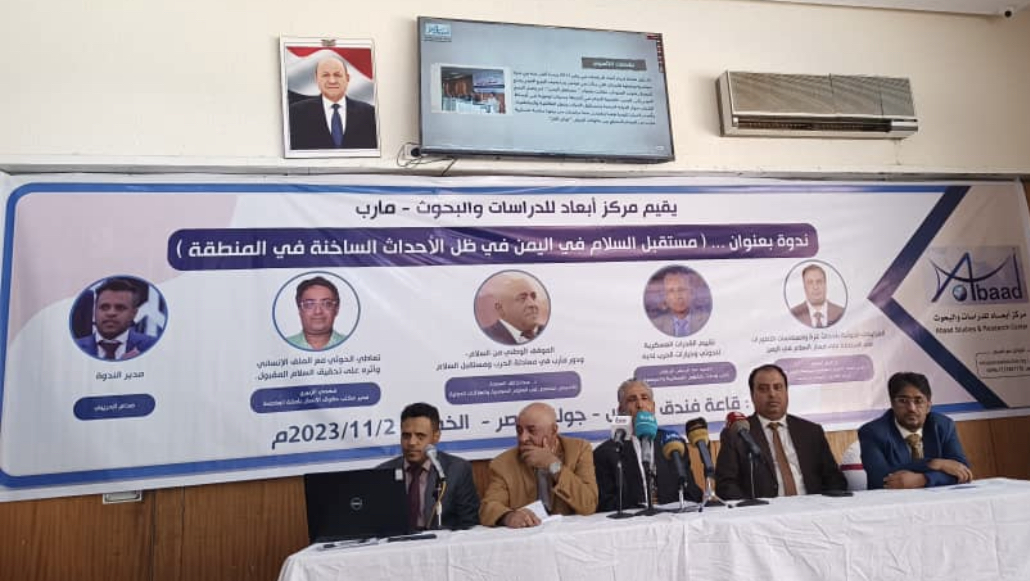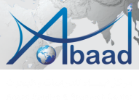Participants in Abaad Panel Discussion: The Yemeni issue is likely to witness further escalation in the forthcoming phase

A panel discussion, under the title "The Future of Peace in Yemen in light of the hot developments in the region" recommended that all Yemeni components and regional and international actors should work towards achieving a just and comprehensive peace through creating the objective factors conducive to peace and avoiding the leaps to deals that merely pave the way for more fighting or future cycles of conflict in the future.
The panel, which was held in Marib, stressed the importance of the role that this province could play in advancing the peace process in the country because of its political, military, economic and humanitarian significance. Marib was described as the center of the Yemeni army, an important source of Yemeni economy through oil and gas, and embracing the largest displaced population who have received direct attention from the state due to efforts of Major General Sultan Al-Arada, Deputy Chairman of the Presidential Leadership Council, who directly supervises the role played by the local authority in development and services.
The panel recommended that the components of legitimate government should ensure the unity of purpose and should have a unified vision of peace in accordance with international resolutions, taking into account the developments taking place in the region. It also called on humanitarian organizations and regional and international parties to deal with this province according to the fact that it is the center of balance in any peace process and the largest gathering of the IDPs from the various Yemeni governorates.
On the pivotal role of Marib in formulating the future of the current stage, Dr. Abdel Khaleq Al-Sumda, an academic specializing in political science and external relations, talked about the national vision of peace based on the three references, and the role of Marib governorate in the war and the future of peace due to its military, economic and demographic weight. He pointed out that it represented the first nucleus of resisting the coup and embraced the army and its higher institutions.
Dr. Al-Sumda valued the responsible role played by the local authority through providing one-sided humanitarian initiatives, such as announcing its willingness to open roads and export electricity to other governorates, including Houthi-controlled ones.
For his part, Dr. Ammar Al -Bukhaiti, head of the Department of Political Science at the University of Saba Region, reviewed the influence of the Israeli aggression on the Gaza Strip on the Yemeni situation, describing the Houthi moves on the Palestinian issue as "manipulative". Dr. Al-Bukhaiti added, "The Houthis seized this opportunity to mobilize and recruit fighters and to make preparations at the domestic fronts level. It established a camp which it called the Jerusalem Liberation Camp in Hodeidah and conducted a military maneuver in Mas Camp in Marib calling it 'Al-Aqsa Flood'. It also escalated its military actions and mobilization in Marib, Taiz and along the borders with Saudi Arabia in a move that betrays the intent to return to war."
Brigadier Abdul Rahman Al-Rubaie, a military and political analyst, discussed the military capabilities of the Houthis, the size of the weapons and the arsenal they controlled and which essentially belonged to the Yemeni military. He states: "The Decisive Storm has destroyed most of them, but Iran is still providing support and smuggling weapons to the Houthis."
Brigadier Al-Rubaie stressed that Iran considered Yemen its main front in the region, providing several reasons for his argument, including "its proximity to the Gulf states, led by the Kingdom of Saudi Arabia, and the strategic and geopolitical location of Yemen, which supervises Bab al-Mandab Strait and the Red Sea, which is an important commercial corridor for international shipping, in addition to the demographic density in Yemen, especially in the northern tribal areas, where people are generally capable of using weapons."
The humanitarian axis was discussed by the Director of the Human Rights Office in the capital, Fahmy Al-Zubairi, who spoke about the violations that the Houthi group has been committing since the beginning of the war.
During the panel, the management of the Abaad Studies Center - Marib branch made a presentation of the center activities, studies and research services.







